CLICK ME
Menu
Interview
Jan 15, 2021
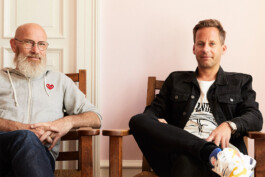
To those who are unfamiliar with the concept, coaching may seem like a costly luxury reserved for those in leadership positions. But this is not how it goes at Headlight. As founders of this all-inclusive coaching service Oliver Bernhard and Erik Algreen are on a mission to increase workplace enjoyment and efficiency across the board.
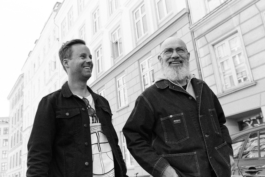
Coaching is one of the best tools for growth and improving work performance, say Erik Algreen and Oliver Bernhard. Not just because the two men happen to be founders of a coaching service, but because they've been there and done it themselves.
When they first met in 2016, the older Algreen had already moulded some of his own hard life lessons into a marketable coaching system – an early version of what is now the Headlight Method. Bernhard, a much younger entrepreneur and CEO, found in Algreen's method a way to untie the knots that had developed in his work life, and a fresh business partnership was born.
Today, they sit together at the helm of Headlight, a small firm that prides itself on affordability, flexibility, and measurable results, with a fierce determination to spread the coaching gospel to the masses. But what's it all about, this coaching business, and how do they approach it? We sat down with Bernhard and Algreen at the Headlight HQ in Copenhagen to find out.
"After all, it's one of the best tools for personal change and growth."
What's the main purpose of Headlight?
Oliver: To democratise coaching, to present it in a format that distributes it more evenly. It used to be that only the top leadership were offered coaching sessions. But we think it should be something that is available to many more people. After all, it's one of the best tools for personal change and growth.
Erik: It's kind of silly for a company with 200 employees to offer coaching to only four individuals in key positions. The thinking is that if they perform well, the business will thrive. But why not give 200 people the chance to work better, so there are more clear heads to do the thinking? People are amazing, so if they enjoy their work more, I can enjoy my work more, and everything improves within the company.
Oliver: Also, business leaders are usually experienced and highly skilled people; they already know how to lead and make decisions. In terms of efficiency, it makes much more sense to coach some of the younger employees who are facing a much steeper learning curve.
How does your approach to coaching make you stand out among your competitors?
Oliver: We offer a digital service with a personal contact. There is a human at the other end of the line, of course. This is your personal coach, facilitating your progress. The traditional way of coaching is time consuming and not exactly 2021-ish. We wanted to find out how technology could ease the process. With our app you book sessions, store notes and resumés, and it contains tools to work with between sessions. The coaches we hire are already great at what they do. All we add to their skillset is the Headlight Method. It provides a shared vocabulary and a common ground on which to develop individually, and as a team.
Erik: We use a fully standardised method. This sounds horrible to some people, but most of our clients think it's wonderful.
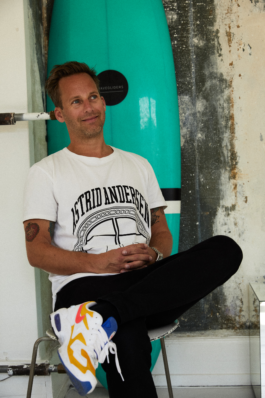
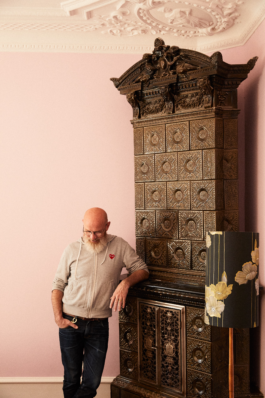
How did the Headlight Method originate?
Erik: It's something I have developed during the past twenty-odd years. It's still based on the same fundamental principles, and currently on its thirteenth iteration. I have since made it more effortless, rational, and efficient. We emphasise the rational aspect of the method. Some like it, some don't. Some prefer to mess about for years without really getting anywhere, but that's not what you get from us. We facilitate results. The method stands on three pillars: Love, compassion, and accountability. We love our participants, and we care about their progress. We say that our coaches carry imaginary baseball bats, and they are not afraid to swing them. This is a rare thing in coaching. Many coaches are simply reluctant to commit to their clients' goals, and instead resort to lip service, which only serves to stigmatise and stagnate the participant.
Why do some people think that coaching must be a never-ending, difficult process?
Erik: In the field of personal development there is this notion that you approach a client like an onion, peeling off layer after layer before reaching the core. This takes a lot of time, and apparently that's part of its appeal to some people. But my own experience wasn't of slow, incremental transformation. My reasoning was that if you're not afraid to lose, you can do things you didn't think were possible. But how nice it would be to do so without getting bruised along the way.
I trained as a blacksmith. With this comes a dose of rational thinking. You measure twice and cut once, meaning that with a minimum of preparation you can increase your chance of success drastically. When you reach the end of the outcome, you evaluate, make small adjustments, and do it over in a new way. It's like Kierkegaard said: Live life forwards, understand it backwards. Without action, no experience, which means your knowledge is useless.
Oliver: We are goal oriented. We don't spend a lot of time finding reasons. Rather, we look at what people need to do and how to get there. Our program is scaleable for companies of different sizes. If we go to a firm with 2-300 employees, they're spending a large amount, even at our reasonable rates, so they have to sure of the results, and that this works.
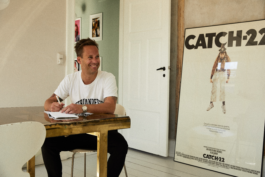
"He pushed me to face some scary decisions, and I grew a lot from it."
Oliver, what kind of situation did you find yourself in when you realised you needed Erik's guidance?
Oliver: I was here, at Nomad, which I founded six years ago with two business partners. Our aim was to set up a work space for creatives. But we didn't know that many creative people. The suggestion came up that we should meet with Erik and tap into his huge network. I remember thinking I had to play the role of the sceptical CEO. Erik sat there, big beard and an open laptop with a Hellfire Canyon Club sticker on the lid. I asked about it, and Erik said: "Oh, that's just an L.A. motorcycle club I'm in with Billy Idol and some guys from The Sex Pistols." I immediately knew that Erik was our guy. Well, we had some difficulties cooperating within our small partner group, so we never got into the things he was supposed to help us with. Instead, Erik guided me along my personal path to success with this place. He pushed me to face some scary decisions, and I grew a lot from it. From then on, it was a smooth transition into the business relationship we have today.
I was on the board of a couple of companies, and there I saw many people who could benefit from Erik's guidance, so I began to think about how to offer the service cheaper and faster.
Does the coach help define a client's goals if he or she is unclear about them?
Oliver: No. The goals must come from yourself. The coaching process begins with a questionnaire, so you can arrive with a blank slate and get started. We don't need to analyse your background.
Erik: We provide structure and facilitation via our Headlight coaches. The question we ask is: where are results not manifesting in your work life? And the answer is what sets the goal. The rest is love, compassion, and accountability. If you say that something is important to you, it should remain so when you leave here. The role of the coach is to help you manifest your own decisions with conviction, not to tell you what to do in the first place.
When is a coaching process over?
Oliver: From our perspective, you always need a coach. You can't go to the gym three times total and expect to stay in shape. But if you keep at it for a longer time, you will keep improving. Of course there will be times when our clients feel a greater need for us than others, so it's perfectly fine for them to take a break and come back when the time is right. That's a healthy and sustainable approach to work.
You have stated before that it's not the lack of skills that's holding you back, but your approach to life and other people. What do you mean by that?
Oliver: We believe that the greatest leaps are made by working with yourself and your approach to life. Getting on a school bench or taking a course in negotiation skills or whatever is great, and we all like to learn. But it's only in the real world that change happens, and when you do something is when you obtain true experience. We also firmly believe that people can do just about anything they set their minds to. Our method helps clarify their aims, and many are surprised at how simple it really is.
"The complexity standing between you and your goals is a creation of your mind to avoid failing."
Erik: It's a sweet coping strategy; everytime the world changes, you can just read a new book. We know that people are extremely capable, it's just that they sometimes lack the courage to do what they really want. The complexity standing between you and your goals is a creation of your mind to avoid failing – the excuses are endless. Anything you can tell yourself so you won't open that sushi bar or whatever your vision may be. Bad friends are the ones who go along with the excuses, good friends are the ones who don't. At age two, you meet the world head-on, represent yourself to the fullest and without fear, because you have never been let down or rejected before. As disappointment comes along later in life, you begin to build strategies to avoid getting bruised, and this becomes integrated in your personality. We're about reconnecting with that inner voice.
Not seeing the results you want in your work life? Drop by at weareheadlight.com to find out what Headlight can do to help you move forward. See you there!
Blegdamsvej 6, 1st floor
Copenhagen, Denmark
Telephone +45 3232 3232
journal@weareheadlight.com
© 2020 Headlight Journal. All rights reserved.
Blegdamsvej 6, 1st floor
Copenhagen, Denmark
Telephone +45 3232 3232
journal@weareheadlight.com
© 2020 Headlight Journal. All rights reserved.